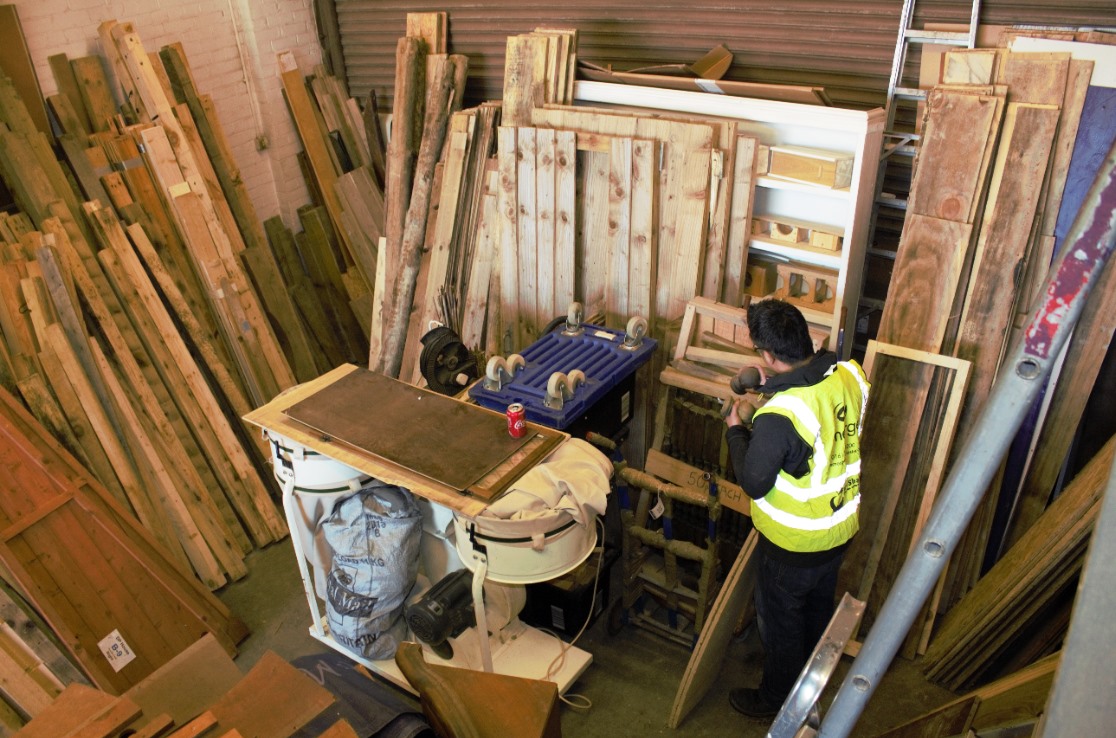
Touch Wood is a workshop and reclaimed wood store run by EMERGE Recycling.
It's a fact that the UK generates around 5 million tonnes of wood waste every year, but less than 1% is reused, however, touch Wood rescues waste timber that would otherwise be landfilled or turned into woodchip, creating jobs and training opportunities for disadvantaged local people at the same time.
They collect from construction sites, industrial estates and other commercial sources, reclaiming everything from pallets to indoor cycle tracks.
Anything they can’t reuse is locally recycled, so nothing goes to waste.
Adults of all ages and backgrounds welcome- no experience necessary!
Come and volunteer for us and spend as much or little time as you have to spare 🪵🔨
✉️: info@touchwood.org.uk
📞: 0161 223 8200 pic.twitter.com/EsZl4pN1wQ— Touch Wood (@EMERGETouchWood) August 16, 2022
The workshop is managed by EMERGE Recycling. They work in partnership with the National Community Wood Recycling Project, a nationwide network of community wood recycling organizations who collect and repurpose waste timber.
They bring the wood back to their depot in Manchester, where it’s sorted and divided between stock for resale and stock for their workshop.
In the workshop, qualified joiners work with volunteers to create a wide range of beautiful, practical products by hand.
EMERGE is a trusted supplier to schools, children’s centers, builders, professional craftspeople, homeowners and businesses alike.
Isn't this beautiful? It is.
Recycling waste wood helps conserve natural resources, as it reduces the demand for fresh timber and other materials used in wood production.
Processing recycled wood generally requires less energy compared to manufacturing new products from raw materials, contributing to energy conservation.
By recycling waste wood, communities can significantly decrease the amount of wood waste sent to landfills, mitigating environmental impacts and promoting landfill space conservation.
Decomposing wood in landfills can produce methane, a potent greenhouse gas. Recycling wood minimizes methane emissions, contributing to climate change mitigation.
Supporting the recycling of waste wood encourages sustainable forestry practices by reducing the pressure on natural forests for timber extraction.
Recycling waste wood contributes to the circular economy, creating job opportunities in the recycling and wood processing industries.
Waste wood can be used to generate renewable energy through processes like biomass or wood pellet production, contributing to the diversification of energy sources.
Compared to the extraction and processing of new timber, recycling waste wood generally has a lower environmental impact, including reduced deforestation and habitat disruption.
Encourage community members to separate wood waste from other types of waste to make recycling processes more efficient.
Support businesses and manufacturers that use recycled wood products. This creates market demand, driving the recycling industry forward.
Increase awareness within the community about the benefits of recycling waste wood and the environmental impact of proper waste disposal.
Engage with local recycling programs and initiatives. Attend workshops or events organized by recycling facilities to learn more about waste reduction and recycling.
Advocate for policies that promote and incentivize waste wood recycling at the local and national levels. Support legislation that encourages sustainable waste management practices.
Instead of discarding unwanted wood items, encourage community members to donate or sell them. This extends the life cycle of the wood and reduces overall waste.
Organize or participate in community cleanup events that specifically target wood waste. This helps keep public spaces clean and provides a collection point for recyclable wood materials.
Encourage community members to explore do-it-yourself (DIY) and upcycling projects using reclaimed wood. This promotes creativity and reduces the need for new wood resources.
By actively supporting waste wood recycling efforts, communities can contribute to environmental sustainability, resource conservation, and the overall well-being of the planet.